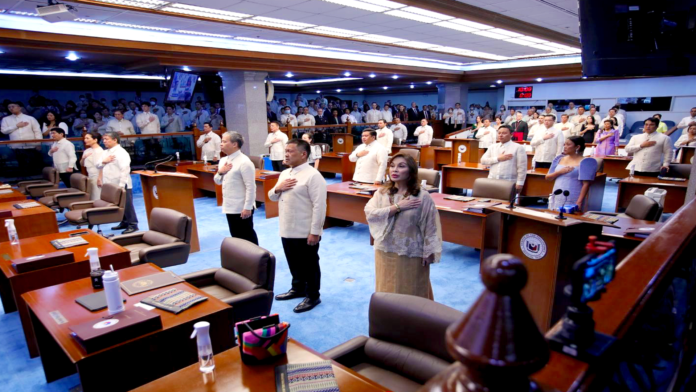The resolution to amend the economic provisions of the Constitution will liberalize the public services, educational institution and advertising industries.
Liberalizing the three sectors will allow foreign corporations or individuals to enter the country and bring more opportunities, explained Senator Sonny Angara, who will lead the subcommittee that will discuss the proposed amendments.
He reiterated in an interview over radio station DZRH on Tuesday that they will not allow any political provision.
Senate President Juan Miguel Zubiri filed on Monday Resolution of Both Houses No. 6, which was also signed by Senate Pro Tempore Loren Legarda and Angara.
It seeks to amend Articles XII, XIV and XVI of the constitution after consulting with President Ferdinand R. Marcos Jr.
“Tingin ko mas maganda ang tsansa ngayon dahil maaga pa sa termino ng ating Pangulo. Dahil kadalasan kapag nasa second half na ay ayaw na ng publiko sasabihin pampahaba lang ng termino. Eh ngayon na maaga pa klaro na ang usapin ay economic provision lang ng Saligang Batas at di ang usapin ng sistema ng gobyerno o termino (I think it has a better chance because it is still early in the term of the President. Because usually if it will be filed in the second half, the public will think that it is for term extension. Now, it’s earlier and clearer that only the economic provisions will be discussed and not the government system or term),” Angara said.
He said when the Senate resumes sessions on Jan. 22, they will start discussions with economic experts and representatives from the industries concerned.
Angara’s subcommittee will be under the Committee on Constitutional Amendments and Revision of Codes, currently chaired by Senator Robinhood Padilla.
In a statement on Monday, Padilla welcomed the resolution citing it as a “very good news for the nation.”
“Magkakaroon na po ng bagong sigla ang ating ekonomiya tungo sa pag-unlad ng buhay ng mga Pilipino (Our economy will be revitalized, and this will lead to progress in the lives of Filipinos),” Padilla said.
Senator Sherwin Gatchalian expressed his full support to the resolution as the proposed amendments “would lead us to fully realize the economic potential of the country.”
Gatchalian noted that despite the country’s growth, the economy is still characterized by constitutional restrictions such as limits to foreign equity in the ownership and operation of public utilities, educational institutions, mass media, and advertising.
“In certain industries, there are restrictions for foreign ownership. Currently, in the case of operation of public utilities, only up to 40 percent foreign ownership is allowed while for educational institutions, even partial foreign ownership is prohibited,” he said in a news release on Tuesday.
Gatchalian cited the Organization for Economic Cooperation and Development 2020 Foreign Direct Investment Regulatory Restrictiveness Index that ranked the Philippines as the third most restrictive among 84 member countries.
He said innovations generated from competition and development of new linkages with regional and global chains will improve the diversity of the Philippine foreign trade portfolio and ultimately increase worker productivity.
Mineral exploration
Meanwhile, Senator Francis Tolentino is proposing to include during the discussions of the proposed amendments to the economic provision of the Constitution the grant of mineral joint exploration with other countries, especially in the West Philippine Sea.
“Para natin ma-explore, ma-develop ang natural resources sa West Philippine Sea, kailangan natin ang puhunan ng ibang bansa. Capitalization ang kailangan natin — yung teknolohiya at equipment nila. Yung pang-drill, pang-extract, yung pang-convert (For us to explore, develop our natural resources in the West Philippine Sea, we need the capabilities of other countries. We need capitalization — their technology and equiment. The drilling, extracting, and converting),” Tolentino said.
Last year, the Supreme Court declared unconstitutional the planned joint marine seismic undertaking (JMSU) of the Philippines, Vietnam, and China in the South China Sea.
The High Court ruled that the JSMU is unconstitutional for allowing wholly-owned foreign corporations to participate in the exploration of the country’s natural resources without observing the safeguards provided in Section 2, Article XII of the 1987 Constitution.
The provision states that “all lands of the public domain, waters, minerals, coal, petroleum, and other mineral oils, all forces of potential energy, fisheries, forests or timber, wildlife, flora and fauna, and other natural resources are owned by the State. With the exception of agricultural lands, all other natural resources shall not be alienated. The exploration, development, and utilization of natural resources shall be under the full control and supervision of the State. The State may directly undertake such activities, or it may enter into co-production, joint venture, or production-sharing agreements with Filipino citizens, or corporations or associations at least 60 percent of whose capital is owned by such citizens.”
Tolentino said a joint exploration in the West Philippine Sea can help the Philippine government solve various issues like in power and oil prices.
“Kasi kapag nakinabang tayo sa natural resources natin don wala na tayong brownout sa Panay. Wala na tayong kulang na hanggang 100 years — mura ang gasolina natin (Because if we benefit from our natural resources there, we will have no more brownouts in Panay. We will have no more deficiency within 100 years — our gasoline would be cheaper),” he said. (PNA)


